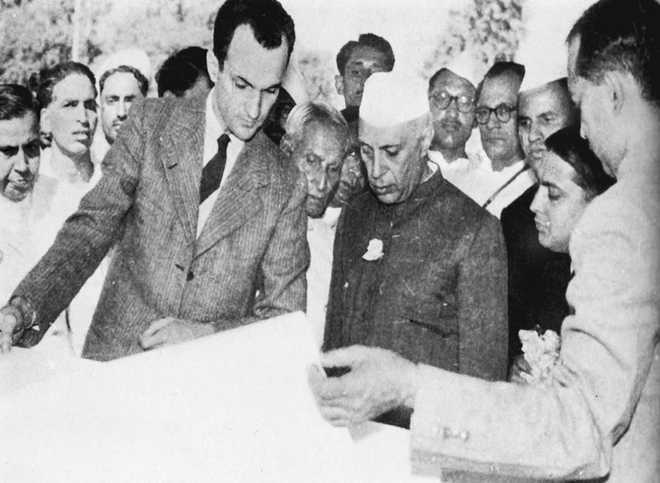Jallianwala memorial’s creator consigned to oblivion
Vikramdeep Johal
Tribune News Service
Chandigarh, April 22
The American architect who designed the iconic memorial at Jallianwala Bagh has largely gone unremembered during the ongoing commemoration of the massacre’s centenary.
Benjamin Polk, who passed away on April 23, 2001, at the age of 84, lived and worked in the sub-continent along with his wife Emily Despain from 1952 to 1964. During this period, he collaborated with several distinguished peers, including fellow American Joseph Allen Stein, TR Mahendru, BK Chatterjee and Suraj P Subherwal.
Polk was introduced to then Prime Minister Jawaharlal Nehru, who headed the Jallianwala Bagh National Memorial Trust, by Rajkumari Amrit Kaur, a renowned Gandhian and India’s first Health Minister.
In his book “Building for South Asia: An Architectural Autobiography”, Polk writes: “An architectural design can be a policy instrument, and this one proved to be so, for my first design caught the attention of the Prime Minister and there was never a hitch from that point on. The project was close to India’s deepest feelings and aspirations, her first national memorial. It was necessary to see oneself as wholly Indian.”
On the lookout for ideas, Polk travelled to the Jain temple towns of Girnar and Palitana in Gujarat. It was the shrines’ towering ‘sikhara’ (‘shikhara’ or spire) that inspired him to envision the central monument (Flame of Liberty) of the memorial, for which red sandstone from Dholpur (Rajasthan) and red granite from Mysore were used. He even factored in the “severe earthquake risks” at Amritsar to come up with a structure that would stand the test of time.
Of the thousands of designs submitted by national and international architects, the Trust approved the one prepared jointly by Polk and his colleague, TR Mahendru. Also involved in the creative process was Suraj P Subherwal. The latter’s son, Vivek Sabherwal, an architect based in New Delhi, recalls, “My father did internship in Polk’s office in 1956 and later got a job there. The Jallianwala Bagh memorial was a special project for him as he was asked to make the initial drawings, based on Polk’s sketches.
The drawings were then slightly modified by the American himself.”
The memorial was inaugurated by then President Rajendra Prasad on April 13, 1961, four decades after the site was purchased for over Rs 5 lakh and became the “property of the nation” — as described by Mahatma Gandhi. Like Port Blair’s Cellular Jail, Jallianwala Bagh is a major tourist attraction that doubles as a place of patriotic pilgrimage.
Polk’s other key projects included the Karachi Polytechnic Institute (Pakistan) and the Tripitaka Library in Yangon (Myanmar). Another feather in his cap was Kathmandu’s Narayanhity Palace. This royal abode witnessed a massacre on June 1, 2001, just over a month after Polk’s death. His wife, a noted conservationist, poet and interior designer, breathed her last in 2008.
Tribute to Gandhi too
The memorial is not only a befitting tribute to the Jallianwala Bagh martyrs, but also to Mahatma Gandhi, who had spearheaded a nationwide fund-raising campaign for the purpose.
Benjamin Polk wrote in “Building for South Asia: An Architectural Autobiography”: “The memorial is built to last the centuries, a 45-foot-high ‘sikhara’ form, framing the relief pattern of a flame of martyrdom… At the four corners of its base is the ‘chakra’ in red granite, the symbol of dynamic peace, Ashoka’s wheel of life, Gandhi’s spinning wheel. This monument beckons to brotherhood, and there is no echo of bitterness.”
In an article published in Young India in February 1920, Gandhi had said: “Nations are born out of travail and suffering. We should forfeit all title to be considered a nation if we fail to treasure the memory of those who, in our battle for political freedom, might innocently or for the crimes of others lose their lives or otherwise suffer.”
Unlock Exclusive Insights with The Tribune Premium
Take your experience further with Premium access.
Thought-provoking Opinions, Expert Analysis, In-depth Insights and other Member Only Benefits
Already a Member? Sign In Now










